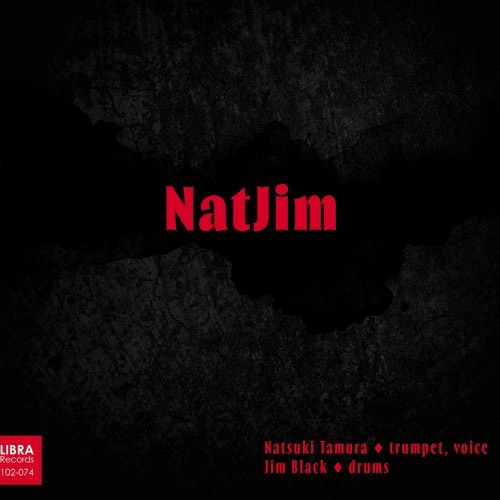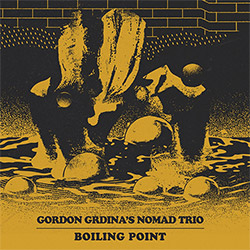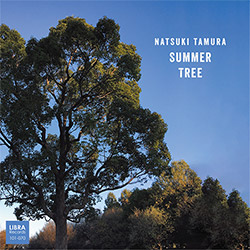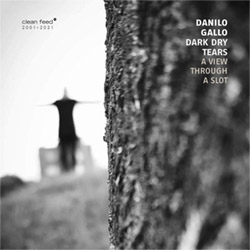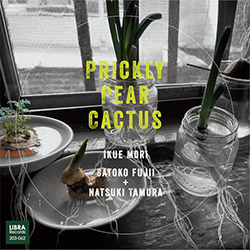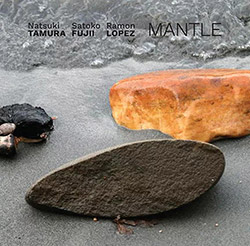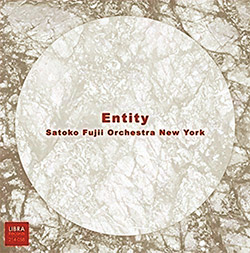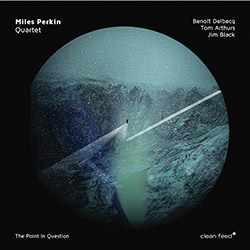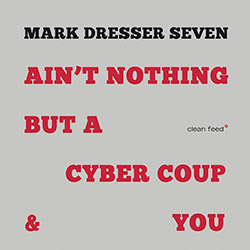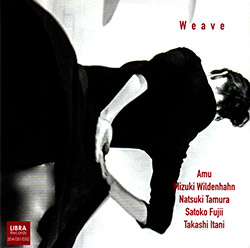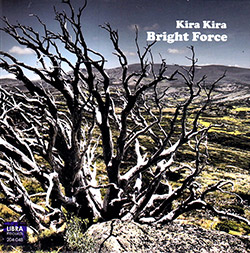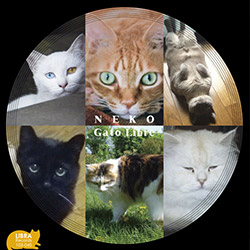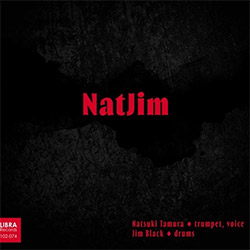
Right out of the gate one feels the energy and excitement between Japanese trumpeter Natsuki Tamura and NY drummer Jim Black, each pushing the other through strong instrumental character and outrageous technique over nine Tamura compositions recorded in the studio in Switzerland, their first recording in 25 years since their 1999 Buzz Records album White and Blue.
In Stock
Quantity in Basket: None
Log In to use our Wish List
Shipping Weight: 2.00 units
Sample The Album:
Natsuki Tamura-trumpet
Jim Black-drums
Click an artist name above to see in-stock items for that artist.
UPC: 4562162308746
Label: Libra
Catalog ID: 102-074
Squidco Product Code: 34601
Format: CD
Condition: New
Released: 2024
Country: Japan
Packaging: Cardboard Gatefold
Recorded at The Zoo Studio in Bern, Switzerland, in November, 2023, by Felix Wolf.
"Few albums convey the pure pleasure of music making better than NatJim (May 17, 2024, Libra Records), the first duo recording by trumpeter-composer Natsuki Tamura and drummer Jim Black in 25 years. It's an inspired reunion. Goading each other to greater and greater heights of improvisational creativity, they lock together effortlessly in vibrant, playful, and surprising tandem. Their a
"Few albums convey the pure pleasure of music making better than NatJim, the first duo recording by trumpeter-composer Natsuki Tamura and drummer Jim Black in 25 years. It's an inspired reunion. Goading each other to greater and greater heights of improvisational creativity, they lock together effortlessly in vibrant, playful, and surprising tandem. Their connection is nearly telepathic, allowing them to spring surprises on each other, change direction without warning, and engage in give-and-take that leaves room for each to express themselves to the fullest possible extent. Simply put, this is a career highlight for two musicians who have already helped define the cutting edge of improvised music in their lifetimes.
Tamura and Black have met on record before, starting with the trumpeter's White and Blue (Buzz Records, 1999), a CD split between duets with Black and fellow drummer Aaron Alexander. Tamura and Black were also members of the Satoko Fujii Four along with bassist Mark Dresser, which recorded two CDs, Live in Japan and When We Were There in 2004 and 2005 respectively. Then after an interval of 18 years, they reunited when Black came to Japan with trombonist Josephine Nagorsnik in September 2023 and performed with Fujii and Tamura for several days. "It was really fun," Tamura says. "After that, I had plans to go to Europe in November, so I thought I'd record with Jim while I was there."
In the studio, after Tamura's minimal explanation of his compositions, the two simply jumped into it and let the music take them wherever it wanted to go. The first six of the album's nine tracks feature Tamura's pieces, that last three are completely improvised. Tamura gave them titles after listening to the finished performances.
"Morning City" gets things off to a boisterous start, with Tamura's bright tone in service to some inventive melodic development while Black's boundlessly creative orchestration of his kit generates a bold spectrum of timbre and extended rhythmic motifs. Their bond seems to only strengthen as they continue with "Afternoon City," as Tamura uses a mute to reach back to the "jungle sound" of early Ellington and Black unleashes one surprise change in rhythm after another. They play with tempo on "City of Dusk," speeding up and slowing down so the music breathes. Tamura's dusky, growling lines leave lots of room for Black's maximalist drumming, dense and busy without ever becoming chaotic.
The elaborate "City of Night" is an album highlight, a startling, kaleidoscopic exercise in musical imagination. They open by exchanging unaccompanied solos, each playing with listeners' expectations. Their phrases slow down or speed up unpredictably, dense edgy motifs suddenly blossom into spacious lyricism, and tone colors change continuously. Then Tamura bursts into urgent abstract vocalizations before they completely change course into a new area. It's an exhilarating, freewheeling performance full of close interaction and attention to sonic detail.
Black is a pioneer of incorporating influences from around the world into a jazz context, most notably post-rock and Balkan rhythms. On "Quiet City," his relentless rock-inflected beat drives Tamura's haunting, heart-piercing inventions. Tamura not only can improvise compelling melody in the jazz tradition, he is a master of extended technique. "Noisy City" showcases his highly rhythmic sound abstractions in sync with Black's forceful beat.
Even without a compositional framework, the last three improvisations display an organic feeling of completeness. Black swathes the opening of "Calm City" with cymbal washes that enfolds Tamura's pensive musings. True to form, they deliberately break the mood with a contrasting abstract sound episode before returning to the atmospheric tone of the opening. On "Bright City," they juggle roiling tempos, more vocalizing from Tamura, and just generally delight in each other's company, as they have throughout the album.
Japanese trumpeter and composer Natsuki Tamura is internationally recognized for a unique musical vocabulary that blends jazz lyricism with extended techniques. In 1997, he and pianist Satoko Fujii, who is also his wife, released their first duo album, How Many? (Leo Lab). They have recorded eight duo CDs together. Kurt Gottschalk writes in the New York City Jazz Record that their rapport "feels like a secret language ... It's rare to sense this level of intuition between musicians."
2003 was a breakout year for Tamura as a bandleader, with the release of Hada Hada (Libra), featuring his free jazz-avant rock quartet with Fujii on synthesizer. In 2005, he made a 180-degree turn with the debut of his all-acoustic Gato Libre quartet, focusing on the intersection of European folk music and sound abstraction. Now a trio, their most recent CD is Koneko (Libra), released in 2020. Writing in the New York City Jazz Record, Tyran Grillo said, "By turns mysterious and whimsical."
In 1998, Tamura released the first of his unaccompanied trumpet albums, A Song for Jyaki (Leo Lab). He followed it up in 2003 with KoKoKoKe (Polystar/NatSat and in 2021, he celebrated his 70th birthday with Koki Solo (Libra), which Karl Ackermann in All About Jazz described as "quirky fun in an age of uncertainty."
In addition to appearing in many of Fujii's ensembles, Tamura also has worked with collaborative groups. Most recently, he joined Fujii and master French composer-improvisers, trumpeter Christian Pruvost and drummer Peter Orins, to form the collective quartet Kaze. With five CDs to their credit since 2011, Kaze "redefines listening to music, redefines genres, redefines playing music," according to Stef Gjissels of Free Jazz Blog.
Tamura's category-defying abilities make him "unquestionably one of the most adventurous trumpet players on the scene today," said Marc Chenard in Coda.
Drummer Jim Black has been a leading voice in creative music for nearly 40 years. While still at Berklee School of Music in Boston, he formed Human Feel with childhood friends Chris Speed and Andrew D'Angelo. After moving to New York in 1991, he quickly became an integral member of the burgeoning Downtown scene, working with some of the leading bands of the time, including Tim Berne's Bloodcount, Dave Douglas' Tiny Bell Trio, and Ellery Eskelin's trio, among many others. As a member of the collective group Pachora (with Speed, Skuli Sverrisson, and guitarist Brad Shepik) Black was one of the leaders in the study and adaptation of Balkan music into jazz-based music. He is also a bandleader in his own right, releasing six CDs by his quartet AlasNoAxis for the Winter & Winter label between 2000 and 2013. In 2016, he moved to Berlin and continues to perform and record as sideman and as a leader of different groups, including a trio with pianist Elias Stemesder and bassist Thomas Morgan and his quartet, Jim Black and the Schrimps. He currently teaches at the Bern University of the Arts, in Bern, Switzerland."-Libra
is nearly telepathic, allowing them to spring surprises on each other, change direction without warning, and engage in give-and-take that leaves room for each to express themselves to the fullest possible extent. Simply put, this is a career highlight for two musicians who have already helped define the cutting edge of improvised music in their lifetimes.Tamura and Black have met on record before, starting with the trumpeter's White and Blue (Buzz Records, 1999), a CD split between duets with Black and fellow drummer Aaron Alexander. Tamura and Black were also members of the Satoko Fujii Four along with bassist Mark Dresser, which recorded two CDs, Live in Japan and When We Were There in 2004 and 2005 respectively. Then after an interval of 18 years, they reunited when Black came to Japan with trombonist Josephine Nagorsnik in September 2023 and performed with Fujii and Tamura for several days. "It was really fun," Tamura says. "After that, I had plans to go to Europe in November, so I thought I'd record with Jim while I was there."
In the studio, after Tamura's minimal explanation of his compositions, the two simply jumped into it and let the music take them wherever it wanted to go. The first six of the album's nine tracks feature Tamura's pieces, that last three are completely improvised. Tamura gave them titles after listening to the finished performances.
"Morning City" gets things off to a boisterous start, with Tamura's bright tone in service to some inventive melodic development while Black's boundlessly creative orchestration of his kit generates a bold spectrum of timbre and extended rhythmic motifs. Their bond seems to only strengthen as they continue with "Afternoon City," as Tamura uses a mute to reach back to the "jungle sound" of early Ellington and Black unleashes one surprise change in rhythm after another. They play with tempo on "City of Dusk," speeding up and slowing down so the music breathes. Tamura's dusky, growling lines leave lots of room for Black's maximalist drumming, dense and busy without ever becoming chaotic.
The elaborate "City of Night" is an album highlight, a startling, kaleidoscopic exercise in musical imagination. They open by exchanging unaccompanied solos, each playing with listeners' expectations. Their phrases slow down or speed up unpredictably, dense edgy motifs suddenly blossom into spacious lyricism, and tone colors change continuously. Then Tamura bursts into urgent abstract vocalizations before they completely change course into a new area. It's an exhilarating, freewheeling performance full of close interaction and attention to sonic detail.
Black is a pioneer of incorporating influences from around the world into a jazz context, most notably post-rock and Balkan rhythms. On "Quiet City," his relentless rock-inflected beat drives Tamura's haunting, heart-piercing inventions. Tamura not only can improvise compelling melody in the jazz tradition, he is a master of extended technique. "Noisy City" showcases his highly rhythmic sound abstractions in sync with Black's forceful beat.
Even without a compositional framework, the last three improvisations display an organic feeling of completeness. Black swathes the opening of "Calm City" with cymbal washes that enfolds Tamura's pensive musings. True to form, they deliberately break the mood with a contrasting abstract sound episode before returning to the atmospheric tone of the opening. On "Bright City," they juggle roiling tempos, more vocalizing from Tamura, and just generally delight in each other's company, as they have throughout the album.
Japanese trumpeter and composer Natsuki Tamura is internationally recognized for a unique musical vocabulary that blends jazz lyricism with extended techniques. In 1997, he and pianist Satoko Fujii, who is also his wife, released their first duo album, How Many? (Leo Lab). They have recorded eight duo CDs together. Kurt Gottschalk writes in the New York City Jazz Record that their rapport "feels like a secret language ... It's rare to sense this level of intuition between musicians."
2003 was a breakout year for Tamura as a bandleader, with the release of Hada Hada (Libra), featuring his free jazz-avant rock quartet with Fujii on synthesizer. In 2005, he made a 180-degree turn with the debut of his all-acoustic Gato Libre quartet, focusing on the intersection of European folk music and sound abstraction. Now a trio, their most recent CD is Koneko (Libra), released in 2020. Writing in the New York City Jazz Record, Tyran Grillo said, "By turns mysterious and whimsical."
In 1998, Tamura released the first of his unaccompanied trumpet albums, A Song for Jyaki (Leo Lab). He followed it up in 2003 with KoKoKoKe (Polystar/NatSat and in 2021, he celebrated his 70th birthday with Koki Solo (Libra), which Karl Ackermann in All About Jazz described as "quirky fun in an age of uncertainty."
In addition to appearing in many of Fujii's ensembles, Tamura also has worked with collaborative groups. Most recently, he joined Fujii and master French composer-improvisers, trumpeter Christian Pruvost and drummer Peter Orins, to form the collective quartet Kaze. With five CDs to their credit since 2011, Kaze "redefines listening to music, redefines genres, redefines playing music," according to Stef Gjissels of Free Jazz Blog.
Tamura's category-defying abilities make him "unquestionably one of the most adventurous trumpet players on the scene today," said Marc Chenard in Coda.
Drummer Jim Black has been a leading voice in creative music for nearly 40 years. While still at Berklee School of Music in Boston, he formed Human Feel with childhood friends Chris Speed and Andrew D'Angelo. After moving to New York in 1991, he quickly became an integral member of the burgeoning Downtown scene, working with some of the leading bands of the time, including Tim Berne's Bloodcount, Dave Douglas' Tiny Bell Trio, and Ellery Eskelin's trio, among many others. As a member of the collective group Pachora (with Speed, Skuli Sverrisson, and guitarist Brad Shepik) Black was one of the leaders in the study and adaptation of Balkan music into jazz-based music. He is also a bandleader in his own right, releasing six CDs by his quartet AlasNoAxis for the Winter & Winter label between 2000 and 2013. In 2016, he moved to Berlin and continues to perform and record as sideman and as a leader of different groups, including a trio with pianist Elias Stemesder and bassist Thomas Morgan and his quartet, Jim Black and the Schrimps. He currently teaches at the Bern University of the Arts, in Bern, Switzerland."-Libra
Artist Biographies
• Show Bio for Natsuki Tamura "Japanese trumpeter and composer Natsuki Tamura is internationally recognized for a unique musical vocabulary that blends extended techniques with jazz lyricism. This unpredictable virtuoso's seemingly limitless creativity led François Couture in All Music Guide to declare that "... we can officially say there are two Natsuki Tamuras: The one playing angular jazz-rock or ferocious free improv... and the one writing simple melodies of stunning beauty... How the two of them live in the same body and breathe through the same trumpet might remain a mystery." Born on July 26, 1951, in Otsu, Shiga, Japan, Tamura first picked up the trumpet while performing in his junior high brass band. He began his professional music career after he graduated from high school, playing in numerous bands including the World Sharps Orchestra, Consolation, Skyliners Orchestra, New Herd Orchestra, Music Magic Orchestra, and the Satoko Fujii Ensemble, as well as in his own ensemble. He was the trumpeter for numerous national television shows in Japan from 1973-1982, including The Best Ten, Music Fair, Kirameku Rhythm and many others. In 1986, he came to the United States to study at Berklee College of Music. He then returned to his native Japan to perform and teach at the Yamaha Popular Music School and at private trumpet studios in Tokyo and Saitama, before coming back to the US to study at New England Conservatory. He made his debut recording as a leader in 1992 on Tobifudo. In 1997 he released the duo album How Many? with pianist Satoko Fujii, who is also his wife. It marked the beginning of an artistic collaboration that continues up to the present. The duo has made a total of five CDs over the years, including 2012's Muku. "Muku contains some truly stunning, spine-tingling music...its sheer beauty and elegance is what lingers most," wrote Dave Wayne in All About Jazz. "Fujii's orchestral technique, clear chromatic lines and "prepared piano" devices contrast effectively with Tamura's arsenal of extended techniques which he executes with a warm, vocalized tone throughout the trumpet's full range," Ted Panken said in his four-star DownBeat review. Tamura's collaborations with Fujii reveal an intense musical empathy, and have garnered wide popular and critical acclaim. Jim Santella in All About Jazz described their synergy well in his glowing review of the couple's 2006 Not Two disc, In Krakow, In November: "... the creative couple forcefully demonstrates what can happen when you let your musical ideas run free... Similarly, Tamura's mournful trumpet can fly high or low in search of his next surprise. Oftentimes, they both issue plaintive moans that sing like angels on high." Their sixth duet album is due out in 2017. In 1998, Tamura began recording his unaccompanied solo performances. The stunning solo trumpet debut release, A Song for Jyaki earned a Writers Choice 1998 in Coda magazine, and Andy Bartlett wrote in Coda, "A fabulous set of hiccuping leaps, drones and post-bop trumpet hi-jinx. Tamura goes from growling lows to fluid, free solo runs and echoes not only Don Cherry's slurring anti-virtuosic chops but also Kenny Wheeler's piercing highwire fullness." He followed it up in 2003 with KoKoKoKe, which Jon Davis described in Exposé as "Buddhist chants from an alien planet." Grego Applegate Edwards explains that on Tamura's most recent solo album, 2013's Dragon Nat, "he pares down to focus on simple unwinding melodic material, the sound of his trumpet as a sensuous thing, a periodicity. Taken as a whole it is a kind of environmental tone poem for the moment Natsuki is in now." 2003 was a breakout year for Tamura as a bandleader, with the release of Hada Hada, featuring his free jazz-avant rock quartet with Fujii on synthesizer. Peter Marsh of the BBC had this to say about the high voltage CD: "Imagine Don Cherry woke up one morning, found he'd joined an avant goth-rock band and was booked to score an Italian horror movie. It might be an unlikely scenario, but it goes some way to describing this magnificent sprawl of a record." The quartet's 2004 Quartet release Exit was deemed "...a brilliantly executed set with a neon glow," by Dan McClenaghan in All About Jazz. In 2005, Tamura made a 180-degree turn in his music with the debut of his all acoustic Gato Libre quartet. Focusing on the intersection of European folk music and sound abstraction, the quartet featured Fujii on accordion, Kazuhiko Tsumura on guitar, and Norikatsu Koreyasu on bass. The quartet's poetic, quietly surreal performances have been praised for their "surprisingly soft and lyrical beauty that at times borders on flat-out impressionism," by Rick Anderson in CD Hotlist. Dan McClenaghan in All About Jazz described their fourth CD, Shiro, as "intimate, something true to the simple beauty of the folk tradition...Tamura's career has largely been about dissolving musical boundaries. With Gato Libre and Shiro, the trumpeter extends his reach even deeper into the prettiest, most accessible of his endeavors." After the unexpected passing of Norikatsu in 2012, Tamura added trombonist Yasuko Kaneko to the group. The new configuration has toured Europe and Japan and released its debut recording, DuDu, in 2014. "DuDu follows the winning formula of its predecessors but, as with the other discs, eschews the formulaic. The result is another sublimely satisfying, elegant record that brims with raw excitement and a reflective nostalgia," writes Hrayr Attarian in All About Jazz. With the tragic death of guitarist Kazuhiko Tsumura, Gato Libre is now a trio. They will release a CD and LP in 2017. In 2010, Tamura debuted a new electric quartet, First Meeting, featuring Fujii, drummer Tatsuhisa Yamamoto and electric guitarist Kelly Churko. Their first release, Cut the Rope, is "is a noisy, free, impatient album, and ranks among Fujii and Tamura's most accomplished," according to Steve Greenlee in the Boston Globe. While fronting groups and recording as a leader, Tamura has also played an integral role in nearly all of Satoko Fujii's many projects. He is featured on all of the CDs by Satoko Fujii's various orchestras (NY, Tokyo, Nagoya, Kobe, and Berlin) and has contributed original compositions and arrangements to each of their 19 critically celebrated albums. In addition, he was a featured soloist in the Satoko Fujii Quartet, her avant-rock free jazz group that also included Tatsuya Yoshida of The Ruins. Of his work on the quartet's 2003 release Minerva, Mark Keresman wrote in JazzReview.com, "Natsuki Tamura's trumpet has some of the stark, melancholy lyricism of Miles, the bristling rage of late 60s Freddie Hubbard and a dollop of the extended techniques of Wadada Leo Smith and Lester Bowie." Tamura is a vital member of Fujii's Min-Yo Ensemble as well. "Tamura tempers his avant-garde antics with an innate lyricism," wrote Steve Smith of Time Out New York in his review of Fujin Raijin, the intimate acoustic quartet's debut CD. He's also been singled out for his contributions to Fujii's ma do ensemble. "With Tamura's brash and glowing lines, the band incorporates mesmeric ostinatos and thrusting opuses into the grand schema," Glenn Astarita wrote in Ejazznews about their first CD, Desert Ship. Collaborative groups also play an important role in Tamura's career. Most recently, Tamura joined Fujii and two French musicians, trumpeter Christian Pruvost and drummer Peter Orins, to form Kaze, which made their recording debut in 2011. In 2015, they released their third album, Uminari, which Jazz Magazine (France) called, "a compelling example of free jazz today. Compositions are perfectly scripted, with a well-oiled interaction and playing of beautiful power..." The collaborative trio Junk Box, which he co-founded in 2006 along with pianist Fujii and drummer John Hollenbeck, plays Fujii's "composed improvisations," graphic scores that take "ensemble dynamics to great creative heights," says Kevin Le Gendre in Jazzwise. Their music "is full of bluster and agitation that nonetheless retains moments of great melodic beauty, usually by way of concise, pertly pretty motifs that trumpeter Tamura plays in between bursts of withering roars that often dissolve into austere overtones." Their premiere CD, Fragment, appeared in 2006. As Daniel Spicer wrote of Fragment in JazzWise, "Tamura spits out gloriously rude Lester-Bowie-like snorts, lows like a herd of robotic cattle or makes like a wheezy howler monkey... Cool and clever." Glenn Astarita of All About Jazz declared it "Required listening." Along the way, there have been one-off cooperative groups and sideman appearances for Tamura as well. In the Tank, an ad hoc quartet with Fujii and electric guitarists Takayuki Kato and Elliott Sharp, is a "triumphant electro-acoustic adventure" according to Daniel Spicer of Jazzwise. "Think AMM meets blues guitar meets 1970s Miles Davis and you get some idea of the disc's flavor: a slow-moving panorama for the ears, where sounds are systematically added, repeated, refined, and replaced in turn," wrote Nate Dorward in Cadence. Tamura and Fujii were one of two piano/trumpet duos featured on the Double Duo Crossword Puzzle CD, a live recording with Dutch trumpeter Angelo Verploegen and pianist Misha Mengelberg. Tamura has also toured and recorded with saxophonist Larry Ochs' Sax and Drumming Core, and appeared on albums by drummer Jimmy Weinstein, saxophonist Raymond McDonald, and CDs by Japanese free-jazz pioneers trumpeter Itaru Oki and pianist Masahiko Sato. In 2014 he released Nax, a duet album with bassist Alexander Frangenheim. Tamua has toured throughout Japan, North America, and Europe, appearing at major jazz festivals, concert halls, and clubs." ^ Hide Bio for Natsuki Tamura • Show Bio for Jim Black Jim Black is at the forefront of a new generation of musicians bringing jazz into the 21st century. In addition to being one of the most influential drummers of our time, he is also the leader of one of the world's most forward-thinking bands, AlasNoAxis, featuring his longtime collaborators Chris Speed, Hilmar Jensson and Skúli Sverrisson. Based on the foundation of his virtuosic but highly personal approach to jazz drumming, Black's aesthetic has expanded to include Balkan rhythms, rock songcraft and laptop soundscapes. Though he is revered worldwide for his limitless technique and futuristic concepts, what many listeners treasure in most Jim Black's work is the relentless feeling of joy and invention he brings to his performances. Jim Black's smiling, kinetic, unpredictable presence has enthralled and inspired audiences worldwide for over twenty-five years. Since the mid-90's, Black has played a major role in the incorporation of new sounds and techniques into the jazz/creative music context. As a member of the collective group Pachora (with Speed, Sverrisson, and guitarist Brad Shepik) Black was one of the leaders in the study and adaptation of Balkan music into jazz-based music. His advanced techniques abstracted the odd time signatures of the Balkans into a new polyrhythmic language equally informed by modern jazz, drum&bass and the dumbeks of the Balkans. Black has also been an innovator in the use of electronics in improvisation, bridging the gap between electro-acoustic improv and more jazz-based traditions. Today, Black's performances are just as likely to feature his laptop-based electronic textures as his drumming. Born in 1967, Jim Black grew up in Seattle alongside future colleagues Chris Speed, Andrew D'Angelo and Cuong Vu. After cementing their personal and artistic relationships in Seattle's various youth jazz ensembles, in 1985 they moved to Boston, where Black entered the Berklee School of Music. In Boston, Black, Speed and D'Angelo formed Human Feel with guitarist Kurt Rosenwinkel, which rapidly attracted the attention of the jazz cognoscenti in Boston, New York and beyond. By 1991, Black and the other members of Human Feel had moved to New York City, where they electrified the Downtown music scene then centered around the Knitting Factory and rapidly became among the city's busiest sidemen. Black's early years in New York saw him take featured roles in some of the most critically acclaimed bands of the time, like Tim Berne's Bloodcount, Ellery Eskelin's trio, and Dave Douglas's Tiny Bell Trio. Thus began fifteen years of near-constant touring and recording, with the above bands as well as artists like Uri Caine, Dave Liebman, Nels Cline, Steve Coleman, Tomasz Stanko, and Laurie Anderson. ^ Hide Bio for Jim Black
6/12/2024
Have a better biography or biography source? Please Contact Us so that we can update this biography.
6/12/2024
Have a better biography or biography source? Please Contact Us so that we can update this biography.
Track Listing:
1. Morning City 3:56
2. Afternoon City 5:30
3. City Of Dusk 5:10
4. City Of Night 8:05
5. Quiet City 5:59
6. Noisy City 4:08
7. Calm City 8:15
8. Bright City 4:18
9. Bonus 1:48
Satoko Fujii & Natsuki Tamura's Libra Label
Improvised Music
Jazz
Free Improvisation
Asian Improvisation & Jazz
NY Downtown & Metropolitan Jazz/Improv
Recordings featuring brass instruments - trumpets, trombones, tubas, other horns
Percussion & Drums
Duo Recordings
Staff Picks & Recommended Items
New in Improvised Music
Recent Releases and Best Sellers
Jazz & Improvisation Based on Compositions
Search for other titles on the label:
Libra.


